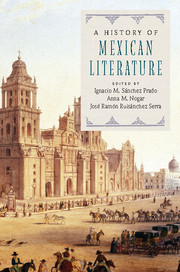Introduction
Published online by Cambridge University Press: 05 July 2016
Summary
Over the past fifteen years, the field of Mexican literary and cultural studies has grown and evolved considerably in the English-language academy. Although the shared border between Mexico and the United States has always precipitated cultural exchange and academic interest, the study of Mexican literature was for many years eclipsed by Chicano studies or by the dominant interest in the Southern Cone within Latin American letters. In the past decade and a half, however, a new generation of scholars of Mexican literature and culture has achieved tenure-line positions in universities in the United States and Canada, most tellingly at institutions where the field had not previously been represented. This is also the case in Great Britain, where scholars of Mexican literature are found not only at flagship institutions such as Cambridge and Oxford, but also, and increasingly, at universities from Sussex to Ulster. The number of graduate students pursuing doctoral work in Mexican literature has increased exponentially, and the quantity and variety of courses on Mexico aimed at undergraduates has grown correspondingly. The field has become so active that Mexican literature is the sole subject of three yearly conferences in the United States (University of California-Santa Barbara, University of Texas at El Paso, and University of California-Irvine). The Modern Language Association has a stand-alone discussion group on Mexican literature with nearly two hundred members, and the Mexico section of the Latin American Studies Association is currently the largest entity within the institution, due to the significant membership of literary scholars. This has tendered an interest in the study of Mexico, one separate from the continental Latin American perspective, as new scholarship has emphasized many specific traits and cultural processes that distinguish Mexico from the rest of the Spanish-speaking world. These include the nature of its indigenous cultures; the status of Mexico City as a viceregal capital during the colonial period; the early triumph of liberalism in the cultural field of the nineteenth century; the experience of the French and U.S. invasions; the Mexican Revolution; and, perhaps most notably of all, the two periods (the Porfiriato and the PRI regime) that established unparalleled, decades-long intervals of stability that in turn allowed for the construction of unusually institutionalized structures of national literature.
- Type
- Chapter
- Information
- A History of Mexican Literature , pp. 1 - 14Publisher: Cambridge University PressPrint publication year: 2016



